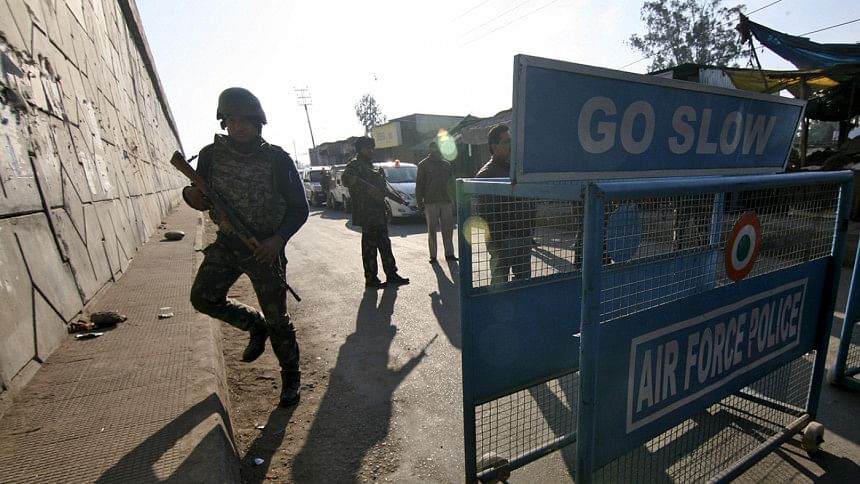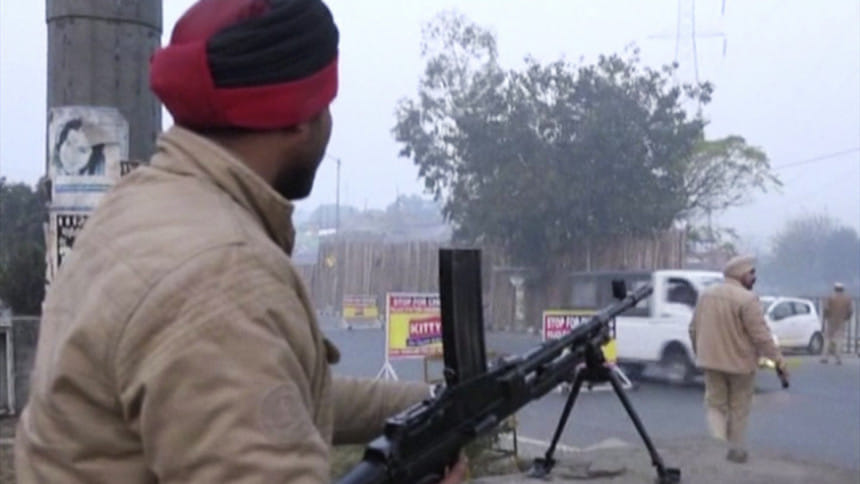6 killed in India air force base attack

Four gunmen and two guards were killed when unidentified militants attacked an Indian Air Force base near the Pakistan border on Saturday in an apparent challenge to attempts to revive a dialogue between the nuclear-armed neighbours.
Officials said the gunmen, wearing army fatigues, managed to enter the Pathankot air base in India's northwestern state of Punjab before dawn on Saturday. Once inside, they opened fire indiscriminately.
They had earlier hijacked a police officer's car and driven it to the heavily guarded base - tactics used in earlier attacks believed to have been perpetrated by Pakistani-trained militants, Punjab's police chief Suresh Arora told Reuters.
The four gunmen and two guards were confirmed killed, according to a home ministry official.
Sporadic gunfire and helicopters flying overhead could still be heard as an operation to comb the base in search of any more gunmen continued, police said. There was no immediate claim of responsibility for the attack.
The attack came a week after Indian Prime Minister Narendra Modi made an impromptu visit to Pakistani counterpart Nawaz Sharif, in a bid to revive bilateral talks that had previously been derailed by militant attacks.
#INDIA Hours-Long Gun Battle Over In #Punjab's #Pathankot Air Base: 4 Attackers & 2 Troops Killed: @ANI_news. pic.twitter.com/L4lwbtKJ7D
— Terrormonitor.org (@Terror_Monitor) January 2, 2016
"The moment that Modi touched down in Lahore (and probably even before), something like this was doomed to happen," said Michael Kugelman, a South Asia expert at the Wilson Center think tank in Washington.
"At this point, there's sufficient goodwill in India-Pakistan relations to weather this attack. Saboteurs won't win this one," he said.
Indian Home Minister Rajnath Singh told ANI, a Reuters affiliate: "Pakistan is our neighbour and we want peace, but any terrorist attack on India will get a befitting response."
His comments were interpreted by Indian analysts as showing restraint and indicating that New Delhi wanted to continue talks with Pakistan.
Sleeper cells
TV footage showed armed guards outside the heavily fortified air base, which is located 50 km (30 miles) from the border with Pakistan. Police stepped up vehicle checks in the area.
Indian security sources said that, based on their initial analysis, the attack may have been carried out by Jaish-e-Mohammed, or the Army of Mohammed, a militant group based in Pakistan that demands independence for Indian-ruled Kashmir.
"Punjab is also a corridor for drug smuggling and we are now realising that several sleeper cells have been activated in Punjab," said one home ministry source, who spoke on condition of anonymity due to the sensitivity of the matter.

However, Saturday's pre-dawn attack was much more audacious in targeting a large military facility, from which India's Russian-made fleet of MiG-21 fighter jets and Mi-35 attack helicopters fly.
The state of Punjab and neighbouring Jammu were on high alert and all defence bases had been sealed.
"Attacking an air base is a serious security threat. The new strategy of the terrorists is to identify defence bases near the border and launch attacks," said the home ministry official.
Security experts say that tight security along the disputed frontier running through Kashmir has pushed the focus of militant activity further south towards softer targets in India's Punjab state.
India and Pakistan have fought two wars over Kashmir since independence and partition in 1947. The Muslim-majority region remains a bone of contention that India only recently agreed to discuss after months of on-off attempts to relaunch talks.
"We have seen the same pattern again and again when there are attempts to restart the peace dialogue," said Ajai Sahni, executive director of the Institute for Conflict Management in New Delhi.
"It may lead to a momentary pause in the peace dialogue and attacks from the opposition for not pursuing a harder line but I don't think it will have a long-term impact."

 For all latest news, follow The Daily Star's Google News channel.
For all latest news, follow The Daily Star's Google News channel. 








Comments